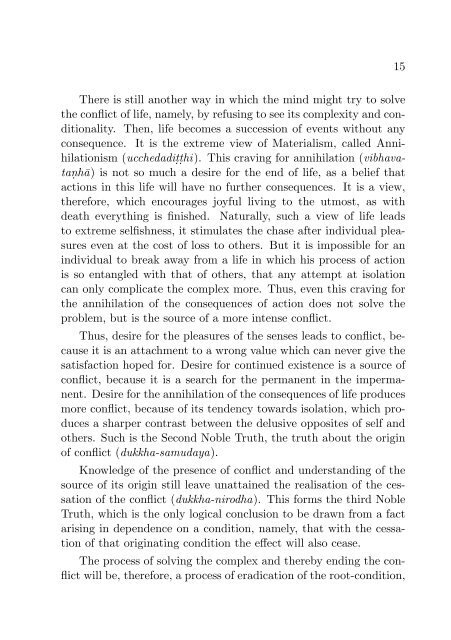Truth and the Way
The Noble Truths and the Way to realise them.
The Noble Truths and the Way to realise them.
You also want an ePaper? Increase the reach of your titles
YUMPU automatically turns print PDFs into web optimized ePapers that Google loves.
15<br />
There is still ano<strong>the</strong>r way in which <strong>the</strong> mind might try to solve<br />
<strong>the</strong> conflict of life, namely, by refusing to see its complexity <strong>and</strong> conditionality.<br />
Then, life becomes a succession of events without any<br />
consequence. It is <strong>the</strong> extreme view of Materialism, called Annihilationism<br />
(ucchedadiṭṭhi). This craving for annihilation (vibhavataṇhā)<br />
is not so much a desire for <strong>the</strong> end of life, as a belief that<br />
actions in this life will have no fur<strong>the</strong>r consequences. It is a view,<br />
<strong>the</strong>refore, which encourages joyful living to <strong>the</strong> utmost, as with<br />
death everything is finished. Naturally, such a view of life leads<br />
to extreme selfishness, it stimulates <strong>the</strong> chase after individual pleasures<br />
even at <strong>the</strong> cost of loss to o<strong>the</strong>rs. But it is impossible for an<br />
individual to break away from a life in which his process of action<br />
is so entangled with that of o<strong>the</strong>rs, that any attempt at isolation<br />
can only complicate <strong>the</strong> complex more. Thus, even this craving for<br />
<strong>the</strong> annihilation of <strong>the</strong> consequences of action does not solve <strong>the</strong><br />
problem, but is <strong>the</strong> source of a more intense conflict.<br />
Thus, desire for <strong>the</strong> pleasures of <strong>the</strong> senses leads to conflict, because<br />
it is an attachment to a wrong value which can never give <strong>the</strong><br />
satisfaction hoped for. Desire for continued existence is a source of<br />
conflict, because it is a search for <strong>the</strong> permanent in <strong>the</strong> impermanent.<br />
Desire for <strong>the</strong> annihilation of <strong>the</strong> consequences of life produces<br />
more conflict, because of its tendency towards isolation, which produces<br />
a sharper contrast between <strong>the</strong> delusive opposites of self <strong>and</strong><br />
o<strong>the</strong>rs. Such is <strong>the</strong> Second Noble <strong>Truth</strong>, <strong>the</strong> truth about <strong>the</strong> origin<br />
of conflict (dukkha-samudaya).<br />
Knowledge of <strong>the</strong> presence of conflict <strong>and</strong> underst<strong>and</strong>ing of <strong>the</strong><br />
source of its origin still leave unattained <strong>the</strong> realisation of <strong>the</strong> cessation<br />
of <strong>the</strong> conflict (dukkha-nirodha). This forms <strong>the</strong> third Noble<br />
<strong>Truth</strong>, which is <strong>the</strong> only logical conclusion to be drawn from a fact<br />
arising in dependence on a condition, namely, that with <strong>the</strong> cessation<br />
of that originating condition <strong>the</strong> effect will also cease.<br />
The process of solving <strong>the</strong> complex <strong>and</strong> <strong>the</strong>reby ending <strong>the</strong> conflict<br />
will be, <strong>the</strong>refore, a process of eradication of <strong>the</strong> root-condition,
















